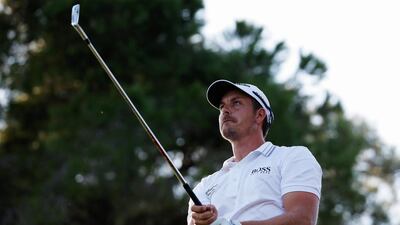It has become the week’s running joke. Although, since we are talking about golf, walking joke might be a more accurate description.
Whenever Henrik Stenson has spotted neighbour Ian Poulter at this week's European Tour event in Turkey, the Turkish Airlines Open, one of them has theatrically draped a folded, white golf towel over their left arm, then gestured toward the other, like a waiter taking a meal order.
The gag dates back several days, to when Poulter spied Stenson being interviewed at their home club in Orlando, Florida, and offered a challenge.
If the Englishman catches Race to Dubai leader Stenson in the tour’s annual sweepstakes, which culminate later this week at the DP World Tour Championship in Dubai, the Swede has to pay for dinner.
They have been trading birdies and pantomimes ever since.
“I kind of knew he was playing all right,” said Stenson after the second round on Friday, “because he had the white towel around his arm, showing me how I’m going to be looking when I’m pouring his drink.”
Those familiar with Stenson’s travails are smirking.
He has played the waiting game twice before, if you will, and come out a winner.
He is not one for waving any white flag of surrender, either.
For the second time in his career, the former Dubai resident has resurrected himself, putting together a career-best season and climbing to the top of the European Tour points list, only 20 months after it appeared he was on a slow slide to oblivion.
After winning the so-called fifth major at the 2009 Players Championship, he climbed to world No 4, then toppled off the mountain.
Beset by personal, professional and physical issues — the triple crown of headaches — an unusual golf irony took hold of his game. Fighting a scorching hook, he had begun a fast fade to irrelevance.
By February 2012, he had skidded to No 230 in the world. His swing coach of the past 11 years, Pete Cowen, half-jokingly called their joint reclamation project, the “raising of the dead”.
Indeed, in a game of peaks and valleys, Stenson had found a Scandinavian fjord.
Hidden behind his trademark wraparound sunglasses, it is not always easy to get a read on the two-time Ryder Cup player. For most of 2010/11, new chapters were quickly being written and none of them were constructive.
Stenson, 37, was famously among the victims of jailed American financier Allen Stanford’s well-chronicled Ponzi scheme, which did a number of the Swede’s assets. “He lost all his money, and everybody thinks that was the cause of all this,” Cowen said. “But that was only part of it.”
In late 2010, he contracted a mysterious stomach parasite that took months to shake. Lean to begin with, Stenson had no energy, dropped several pounds of muscle tone and ruined his swing trying to play through it. “He went from a 6ft 2ins man’s body to a 6ft 2ins boy’s body,” Cowen said.
“He could not train, he lost his energy, his confidence. He lost his glutes, his shoulders, everything.”
Stenson had lost everything before. In 2001, he had the yips so badly with his driver, he walked off the course after three shots in a row sailed out of bounds, claiming he felt “depressed and embarrassed” about playing in public. It took two years, as Stenson slipped outside the world top 600, but he and Cowen retooled his game. By comparison, his 2011 issues were a minor tune-up.
“You don’t lose the golf DNA,” Cowen said. “Sometimes you just lose control of it.”
Shortly before Stenson won a European Tour event in South Africa exactly 12 months ago to truly start the comeback, he told Cowen “I think I know where I am”.
Indeed, with two victories this year, the power-hitting Gothenburg native is back among the world’s elite. The only player to amass more world-ranking points in 2013 is Tiger Woods, yet Cowen estimated that Stenson’s confidence ranks around “seven on a scale of 10”.
“He knows he has more to give,” Cowen said.
If not receive.
In September, Stenson claimed the richest payday in golf, winning the Tour Championship on the PGA Tour to also secure the season-long FedEx Cup points title. The combined bounty was US$11.4 million (Dh41.87m). If Stenson repeats the feat this week at the Jumeirah Golf Estates by winning the tournament and points titles, it would be worth another $2.35m.
Stenson, a player twice felled by lengthy slumps, could be the first to win the FedEx and Race to Dubai double in the same year.
Somebody should warn Poulter to wash his white towel. Because Stenson fully intends to have a second helping.
selling@thenational.ae
Follow us on twitter at @SprtNationalUAE

